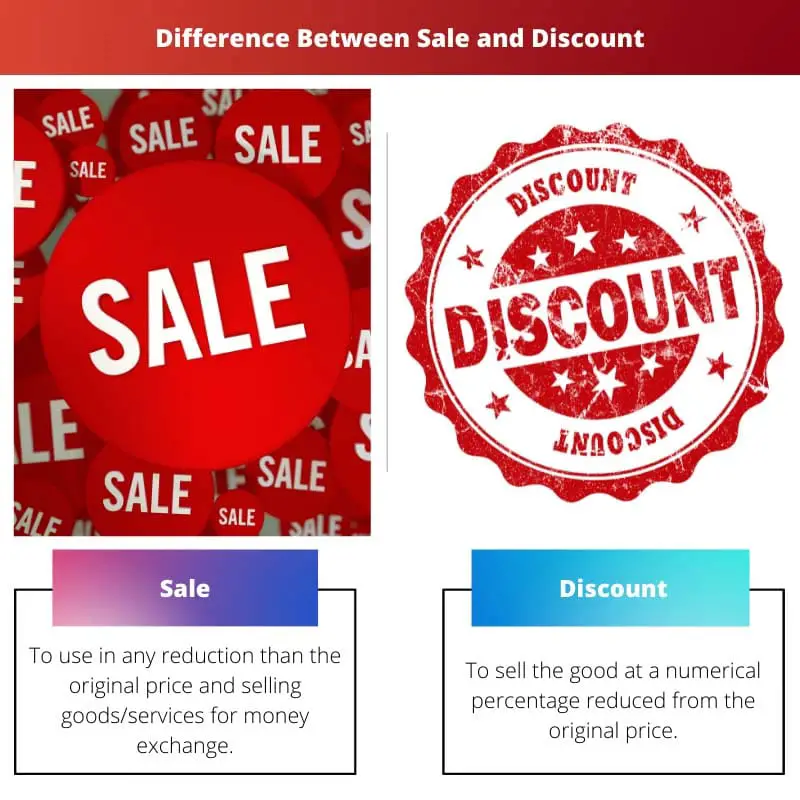Sale and Discount are both nouns that may be used as synonyms but are different in a way. Sale has two significant meanings as a word instead of Discount, mainly used to express deduction.
The first Sale is used to represent the process of exchange through monetization. And the other Sale is used when any materials are sold at a lower price than the original price. Discount is mainly used to describe any percentage reduction.
Key Takeaways
- Sale refers to an event where products are offered at reduced prices for a limited period, while discount refers to a reduction in the original price of a product.
- Sale is a marketing strategy to attract customers, while the discount is a pricing strategy to increase sales.
- A sale may or may not offer discounts, while discounts are offered regardless of whether a sale occurs.
Sale vs Discount
Sale is used when the company sells their products or services at a reduced price. On the other hand, the discount is used when the business or an individual sells their goods or assistance alternatively at a lower price. Generally, it means a deduction of the rate that involves numerical numbers, like a 20% discount.

The word Sale has two significant meanings; first, the exchange of goods and services in exchange for money done between the customer and the seller.
The other one, TI, represents the product’s price markdown (reduced price on goods). It has different reasons for its markdown: Storage for the new collection, promotional PR stunt, to attract new customers, and anything from which the store can profit.
Discount means when the good or service is sold at a lower price than the original set price. Why? Because the materials either get old or are given to regular customers.
For example, 15% off during the dressing of any hair treatment at a salon. Discount can mean a slight reduction of 5% or 7% off the goods. While Sale means a more significant amount like “Sale of buy two and get one free.” Or “Sale: Flat 50% Off”.
Comparison Table
| Parameters of Comparison | Sale | Discount |
|---|---|---|
| Word Origin | Old English word Sala | French word Desconter |
| Mostly used for | To use in any reduction than the original price and selling goods/services for money exchange. | To sell the good at a numerical percentage reduced from the original price. |
| Syllables | 1 | 2 |
| Other meanings | Selling goods/services. | To disregard anybody |
| Another word | Cut-rate Sale | Deduction |
What is Sale?
The name “Sale” came from the old English word “Sala”, which has come from its German roots. It first appeared in 1866 as the meaning of selling goods at a reduced rate than the actual price point.
Sale is a more extensive term if it is to be compared with Discount. One won’t ever hear about a Sale that only offers a small number of discounts or reductions of the prices, like 5 or 10 per cent.
A Sale affects the whole store as they have to be prepared for it for days and sometimes even months, as Sale is something that customers wait for months to come and expect from the store on any occasion.
A prominent example would be the yearly “Black Friday Sale” after Thanksgiving, which holds many items on a big Sale.

What is a Discount?
Discount came from the French word Desconter and has been in commercial use, meaning to deduct the price from the original price from 1977.
It is used when the seller sells their good at a discounted price less than the previously produced price. There can be several reasons for this, but the most used excuse is that the interest is getting old.
It not only means this but is also a regular discount for store workers. The other meaning of a Discount is to disregard somebody.
The reduction Discount doesn’t affect the duties of the employees as it is smaller compared to Sales and can be even a tiny regular part of the store where usually, the items are regularly sold at a discounted price.

Main Differences Between Sales and Discounts
- A Sale is a more significant occasion for a store for it to be selling its markdown products; the stores pay a lot more attention in even making them, like creating Bulletin boards and sending emails to casual customers; while Discount is a minor term, there is not much preparation while selling goods at a Discount.
- A Discount is always given as a numerical number. On the other hand, a sale can be given as “offers” as well. For example: “Buy 1, get one free.”
- A store puts on “Sales” in a particular period during a year to bring in new customers due to reduced prices while also clearing their old stocks. For example, “New Year’s Sale”. In opposition, a Discount can happen when the store wants to eliminate old materials.
- Sale is an equal amount of reduction that everybody from the worker to any new customer is the same. On the other hand, Discounts can be given to in-house employees, friends, and family of workers, managers, etc., working in the place of selling goods or services. Like, “Extra 10% Discount on the whole bill as the family and friends discount.”
- Extra Discounts can be valid on most sales processes—a little example: Getting an additional 5% Discount using the store’s reward card. No extra “Sale” can be there on any discounted item.
- The word Discount can also be used in any non-sale item or process as well. For instance: People above 65 get discounted tickets for travelling on the Railways. Sale is used only in the selling of goods.

- http://jos.unsoed.ac.id/index.php/jame/article/view/3092
- https://journals.sagepub.com/doi/abs/10.1509/jmr.16.0599
Last Updated : 11 June, 2023

Chara Yadav holds MBA in Finance. Her goal is to simplify finance-related topics. She has worked in finance for about 25 years. She has held multiple finance and banking classes for business schools and communities. Read more at her bio page.

The comparison table included in the article is quite useful. It neatly summarizes the key differences between sales and discounts, making it easier for readers to understand at a glance.
I found the comparison table to be a bit unnecessary. It’s an oversimplified representation of the complex relationship between sales and discounts. Its inclusion seems superfluous.
I couldn’t agree more, Zmorgan. The comparison table is an effective tool for digesting the nuanced information presented in the article.
The section on the historical and linguistic origins of ‘sale’ and ‘discount’ was truly intriguing. It’s fascinating to see how language and culture influence the usage and evolution of these terms.
I’m glad you found it interesting, Sean21. Exploring the etymology of words reveals intriguing insights into our historical and cultural narratives.
The article sheds light on the historical origins of the terms ‘sale’ and ‘discount’, which adds an interesting dimension to the discussion. It’s always fascinating to learn about etymological roots.
I share your sentiment, Mitchell. Exploring the etymology of these terms enriches our understanding of their usage and cultural significance.
The article delves into the practical implications of sales and discounts for businesses, offering valuable insights into the strategic considerations involved. It’s a thought-provoking read for professionals in the industry.
I think the article’s focus on business implications is a bit misplaced. It would have been more engaging to explore the psychological and sociological aspects of sales and discounts.
I couldn’t agree more, Philip45. The article provides a comprehensive examination of the business implications, making it a relevant read for industry professionals.
The article is quite informative, but its analysis seems more suited to an academic discussion rather than a practical understanding of sales and discounts. It feels a bit detached from real-world applications.
I respectfully disagree. The detailed analysis provides a strong conceptual foundation, which is valuable for translating theory into practical applications.
Your point is valid, Alfie05. While the analysis is in-depth, it could benefit from more real-world examples and case studies to bridge the gap between theory and practice.
This article provides a clear and comprehensive understanding of the difference between sales and discounts. It’s informative and quite helpful for anyone who wants to understand the nuances between these two terms.
I completely agree, Laura. The article is well-researched and provides valuable insights into the marketing and pricing strategies associated with sales and discounts.
I found the information here quite enlightening. It really highlights the key differences between sales and discounts and their respective impacts on customers and businesses.
The section on the main differences between sales and discounts provides a great summary of the article’s key points. It’s a useful reference for anyone needing a quick understanding of these concepts.
Absolutely, Roberts. Having a concise breakdown of the main differences is beneficial, especially for those looking to get a quick grasp of the topic.
I found it to be quite repetitive. The main differences between sales and discounts were already well-explained in the preceding text. The additional section felt unnecessary.
The article gives a balanced perspective on sales and discounts, highlighting both their similarities and differences. It’s commendable to see a comprehensive view of the topic.
I think the article is an overcomplicated explanation of something quite simple. The difference between sales and discounts is quite obvious and doesn’t require such an in-depth analysis.
I understand your perspective, but I believe the article’s detailed approach provides a more nuanced understanding of these concepts, which can be beneficial for businesses and consumers alike.
I agree with Carter. This level of analysis makes it seem like sales and discounts are more complicated than they actually are. I think a simpler approach would have sufficed.
The article’s meticulous examination of the semantics and nuances between sales and discounts adds a layer of intellectual depth to an otherwise mundane topic. It’s refreshing to see such a rigorous analysis in this context.
I share your sentiments, Zoe21. The article’s intellectual rigor elevates the discourse surrounding sales and discounts, making for a stimulating read.